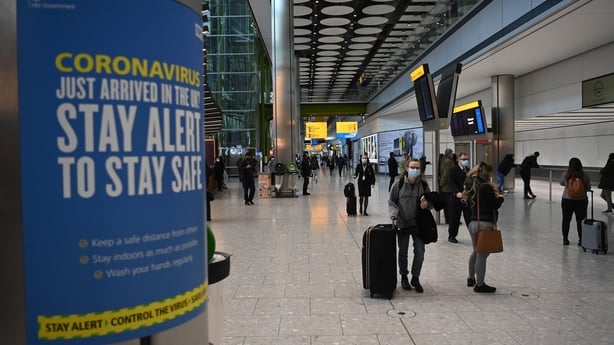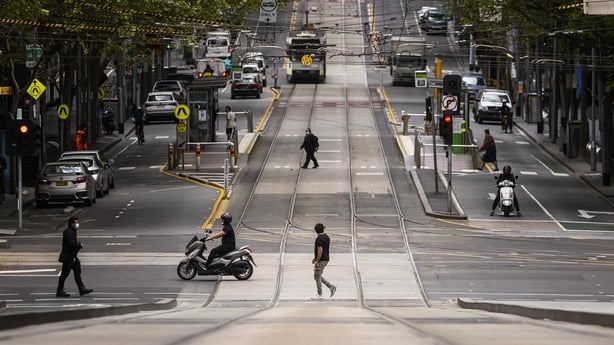World tourism surged in July, thanks to vaccination rollouts and fewer travel restrictions, but traveller numbers still fell far short of pre-pandemic levels, the UN's tourism body has said.
Some 54 million tourists crossed international borders in July, the highest figure since April 2020, in the early months of the coronavirus crisis, the World Tourism Organization said in a statement.
That represented an increase of 58% compared with the level recorded in July 2020, but was still a drop of 67% from the 164 million recorded in July 2019.
"This improvement was underpinned by the reopening of many destinations to international travel, mostly in Europe and the Americas... coupled with progress made in the roll-out of Covid-19 vaccines" which contributed to "gradually restoring safe mobility in Europe and other parts of the world," it said.
Read latest coronavirus stories
"Nevertheless, 2021 continues to be a challenging year for global tourism, with international arrivals down 80% in January-July compared to 2019," said the Madrid-based organisation.
In the first seven months of the year, Asia and the Pacific continued to see the steepest declines, with a drop of 95% in international arrivals, followed by the Middle East where numbers were down 82%, Europe and Africa, which registered a fall of 77%, and the Americas which sustained a drop 68%.
Only a few small islands in the Caribbean, Africa, Asia and the Pacific, alongside several small European destinations recovered and counted arrivals close to, or even higher, than pre-pandemic levels.
Spain, which before the pandemic was the world's second most popular tourist destination, said it welcomed 15 million tourists in the first eight months of the year, a decline of 4.2% from the same period last year, the National Statistics Institute said.
The data cast doubt on the objective set by the Spanish government of attracting some 45 million foreign visitors this year, around half the number of 2019.
"The true restart of tourism and the benefits it brings, remains on hold as inconsistent rules and regulations and uneven vaccination rates continue to affect confidence in travel," UNWTO head Zurab Pololikashvili in the statement.
The UN body said it was expecting to see a "rebound" in 2022 although global tourism is not expected to reach pre-pandemic levels until 2023 or 2024.
UK travel rules simplified to red list

New rules introduced to make travel to the UK "easier and cheaper" have come into force.
The UK's traffic light system involving green, amber and red lists has been scrapped, with locations categorised as either on the red list or not.
It comes amid reports the number of countries on the red list will be slashed to nine from 54 later in the week, with destinations such as Brazil, Mexico and South Africa expected to be opened up to quarantine-free travel.
Fully vaccinated residents and unvaccinated under 18s from more than 50 countries and territories can now enter the UK without needing to complete a pre-departure lateral flow test, take a day-eight post-arrival PCR test costing around £65, or self-isolate at home, with just a single day-two post-arrival test needed.
Under 11s were already exempt from pre-departure testing.
People arriving from a red tier destination will still be required to spend 11 nights at a quarantine hotel costing £2,285 for solo travellers.
Transport Secretary Grant Shapps said: "We are accelerating towards a future where travel continues to reopen safely and remains open for good, and today's rule changes are good news for families, businesses and the travel sector.
"Our priority remains to protect public health but, with more than eight in 10 people now fully vaccinated, we are able to take these steps to lower the cost of testing and help the sector to continue in its recovery."
The easing of the quarantine and testing regulations, announced last month, has been welcomed by the travel sector.
Airlines and tour operators have been hit hard during the coronavirus pandemic and have accused the government of being too slow to relax and simplify the rules for international travel.
Tim Alderslade, chief executive of Airlines UK, a trade body representing UK carriers, said: "Things are moving in the right direction and the removal of these restrictions will make it easier and cheaper for people to travel.
"We've seen a good response to the announcement in terms of bookings and, given current trends, we would hope to see more countries come off the red list and further mutual recognition of vaccine status.
"There is still much to do though. This is not job done, and ministers need to keep in mind that we remain an outlier on arrivals testing for vaccinated passengers.
"In the short-term the removal of PCR testing by the October half-term week is critical, and we look forward to clarity on the start date for this as soon as possible."
No date has been set for when eligible fully vaccinated travellers arriving in England will be able to use a cheaper lateral flow test rather than a PCR version for the day-two post-arrival test.
The Department for Transport said the Government "aims to have it in place for when people return from half-term breaks".
Delta outbreak 'levels off' in Australia
Australia's Delta outbreak appears to have levelled off, with more than half the country in extended lockdowns and vaccination rates starting to approach national targets, Health Minister Greg Hunt said.
Mr Hunt said 80% of Australians will have had their first Covid-19 jabs this week, while the overall battle against the virus has been boosted by the arrival in recent days of 15,000 additional doses of treatment drug sotrovimab.
The Australian government wants all Covid-19 restrictions, including travel bans, to be lifted when 80% of the population above 16 is fully vaccinated. It expects that target will be reached in mid-November.
"There are important reasons for hope," Mr Hunt told reporters in a televised press conference, pointing to a steep fall in new cases in New South Wales state, home to Australia's biggest city Sydney.
"Victoria, yes, it is a big challenge ... But we are beginning to see the flattening of the curve in Victoria," he said.
New South Wales reported 623 new cases and six deaths, down from more than 900 cases a day a week ago.
Victoria state reported 1,377 new Covid-19 infections, up from 1,220 yesterday, but off a record high of 1,488 on Saturday. There were four new deaths.
Officials have blamed a recent spike in Victoria's cases on Australian rules football final parties, in breach of strict lockdown rules the previous weekend.
Nearly half of the new cases today were people between the ages of 10 and 29.
The state's capital Melbourne, in the midst of its sixth lockdown, reached a cumulative total yesterday of 245 days of restrictions since March last year, overtaking Buenos Aires as the city under the longest lockdown, according to local media.

Despite the current downtrend, experts have warned that cases are likely to rise again once the country emerges from lockdown, replicating the experience in other countries that vaccinated earlier.
New South Wales is due to start easing curbs from 11 October, the first Monday after it expects 70% of its population over 16 to be fully vaccinated, up from 67% now.
Victoria hopes to reach the 70% target, up from about 52% now, by 26 October.
GlaxoSmithKline and Vir Biotechnology's sotrovimab has been shown to be effective in reducing hospitalisation and death among high-risk Covid-19 patients when given early in the disease.
Mr Hunt said he hoped another Covid-19 drug, a pill being tested by Merck & Co Inc, would be available in Australia in the first quarter of 2022.
Additional reporting Reuters

